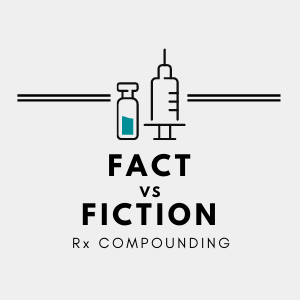
Are you willing to take the risk?
FACT VS FICTION
The difference between 503A compounders, 503B compounders,
and conventional drug manufacturers:
Note: The following chart includes some of the provisions in sections 503A and 503B. It does not include an exhaustive list of conditions or requirements that apply to compounded drugs. Other statutory provisions are applicable.
| 503A | 503B | Commercial Drug Manufacturer |
Drugs compounded in accordance with all conditions of section 503A are exempt from:
|
Drugs compounded in accordance with all conditions of section 503B are exempt from:
|
Drugs made by commercial drug manufacturers comply with:
|
| Drugs compounded in accordance with section 503A are exempt from premarket approval requirements, and therefore FDA does not review the compounded drug products for safety and effectiveness before they are marketed. | Drugs compounded in accordance with section 503B are exempt from premarket approval requirements, and therefore FDA does not review the compounded drug products for safety and effectiveness before they are marketed. | FDA approval of a drug means that data on the drug’s effects have been reviewed by the FDA, and the drug is determined to provide benefits that outweigh its known and potential risks for the intended population. The drug approval process takes place within a structured framework.[1]
This framework often includes a process that involves: discovery/concept, preclinical research, clinical research, FDA review and FDA post-market safety monitoring.[2] |
Compounding is by a:
|
Compounding is by or under the direct supervision of a licensed pharmacist in an outsourcing facility (which is not required to be a licensed pharmacy). | Commercial drug manufacturers hire persons who can make drugs in accordance with current good manufacturing practice. |
| Compounding must be based on the receipt of a valid prescription for an identified individual patient. It can occur after the receipt of the prescription, or in limited quantities before the receipt of such a prescription. | An outsourcing facility may or may not obtain prescriptions for identified individual patients. | Pharmaceutical companies manufacturing approved drugs do not obtain prescriptions for individually identified patients prior to introducing the drugs for commercial distribution. |
| Does not pay an annual fee | Annual establishment fee for fiscal year 2021:
Small business – $5,695 Non-small business – $18,837[3] |
Application Fee for Fiscal Year 2021:
Clinical Data Required – $2,875,842 No Clinical Data Required- $1,437,921 Program Fee: $336,432[4] |
Testimonials from providers and institutions:
“Something’s gonna happen, something’s gonna get missed and we’re gonna get shut down… we were gonna hurt a patient.”
“They all have either significantly lost vision or have been blinded completely by the contamination,”
“It’s normal for people to have an inflammatory response following open-heart surgery, but to have a severe response that results in multi-organ failure — that’s rare,”
What to look for (red flags)
- Terms like Pharma-grade
- The word “Pharma” in quotations